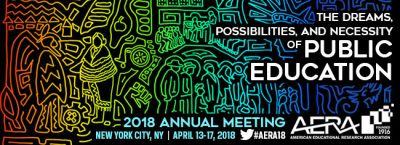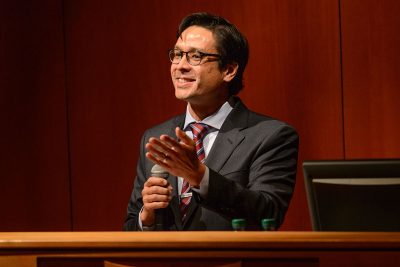Willimantic Chronicle (Mansfield Middle School, UConn partner to support student-run writing center)
8 Questions With a Wealth Manager
Teach.com (Neag School alumna Alexandra Mililli, who previously was a teacher, is now a wealth manager)
Neag School of Education Announces Recipients of Alumni Board Scholarship
The Neag School of Education at UConn announces the recipients of the Neag School of Education Alumni Board Scholarship as Elena Sada, a first-year doctoral student studying bilingual and multicultural education in the Neag School, and Denée Jackson, a master’s student in the Neag School of Education’s Higher Education and Student Affairs program.
The Neag School of Education Alumni Board Scholarship provides a $1,000 award available annually to students enrolled in a master’s, doctorate, or sixth-year program and who have proven academic excellence or demonstrated financial need. The scholarship is intended to invest in the education and experience of Neag School students. For the 2019 academic year, there were 35 applicants.
“The Neag School of Education Alumni Board Scholarship is one that aims to not only support aspiring educators, but also honor the passion and talents of those who are committed to doing what is arguably one of the most important and challenging jobs of today,” says Kate Lund, president of the Neag School of Education Alumni Board. “As a board, we are committed to awarding these important scholarships each year and are entirely grateful for the generous contributions from our alumni, who share our support of and pride in these promising teachers.”
Sada received her bachelor of science in religion from the International Center for Educational Sciences in Rome, Italy, and a bachelor of science in education from Anahuac, Mexico. She received a master’s and advanced certificate in educational supervision and administration from Hunter College in New York City.
Sada’s doctoral research, which is expected to strengthen the relationship between the University of Connecticut and UNICEF, focuses on institutionalized children in Mexico and how dual language education shapes equity and social justice in the classroom.
Sada, who is also a single mother of two adopted children, previously worked as a district supervisor in the West Hartford (Conn.) Public School district’s world languages programs, and as the district supervisor of the English learners and dual language program in the New Rochelle, N.Y., school district.
Jackson received her bachelor of arts in communications from the University of Connecticut in 2014. Jackson was enrolled in a master’s program at North Carolina State University, but she returned to Connecticut after her mother was diagnosed with cancer.
“I approach my learning with a ferocity because the more I learn, the more I can influence change and uplift communities,” says Jackson, whose mother inspired her to pursue higher education. “The more that I learn about oppressive policies within systemically unequitable systems, the more I can do to deconstruct them and build new equitable and inclusive systems.”
“Although my responsibilities sometimes require urgent attention, I have a legacy to uphold. I am hoping that my passion and grit, built on the foundation that my amazing mom instilled in me, will lead me to attaining my master’s and doctoral degrees while espousing my conviction of education as a means to attaining a more socially just world,” says Jackson.
Jackson is currently a Husky Sport mentor, facilitating coursework as well as professional development for a team of 40 graduate and undergraduate students.
She is also a graduate student intern at the UConn Office of Fraternity and Sorority Life, and assisted in the development of a new Greek life program, and advised the 2016 HuskyTHON to benefit the Connecticut Children’s Medical Center.
Sada and Jackson will be recognized at the 2018 Neag School Alumni Awards Celebration, taking place at the Storrs campus in March.
Neag School Faculty, Students, and Alumni to Present at AERA 2018

(Sean Flynn/UConn Photo)
This April in New York City, the American Educational Research Association (AERA)’s Annual Meeting will feature the work of more than 60 faculty researchers, graduate students, and alumni from UConn’s Neag School of Education. An audience of 15,000 scholars, policy experts, practitioners, and AERA members will convene April 13 to 17 for a program that will include upwards of 2,500 sessions focused on the theme of “The Dreams, Possibilities, and Necessity of Public Education.”
Neag School-affiliated attendees will be presenting research papers; leading professional development seminars; taking part in roundtable and panel discussions; speaking on key issues; and accepting awards from various divisions of the AERA. Dean Gladis Kersaint will also be a featured speaker at several networking events for doctoral students, organized though the Universities 21 Forum.
Attending the Annual Meeting?
Print this PDF schedule of the Neag School’s faculty, graduate student,
and alumni AERA sessions to take with you.
The AERA is the largest national interdisciplinary research association devoted to the scientific study of education and learning. Founded in 1916, AERA advances knowledge about education, encourages scholarly inquiry related to education, and promotes the use of research to improve education and serve the public good.
 “The AERA Annual Meeting is an opportunity for education researchers to explore important new findings and innovative ideas that will shape education practices and policies,” says AERA Executive Director Felice J. Levine. “I am looking forward to welcoming more than 15,000 scholars, policy experts, and practitioners to New York City for five rewarding days of ideas, engagement, networking, and professional advancement.”
“The AERA Annual Meeting is an opportunity for education researchers to explore important new findings and innovative ideas that will shape education practices and policies,” says AERA Executive Director Felice J. Levine. “I am looking forward to welcoming more than 15,000 scholars, policy experts, and practitioners to New York City for five rewarding days of ideas, engagement, networking, and professional advancement.”
Access a PDF of the Neag School’s sessions here, which lists the dates, times, and other details for sessions featuring faculty members, graduate students, and alumni of the Neag School.
Are You Serving as a Presenter?
Presenters are encouraged to highlight their research efforts with fellow scholars and other AERA Annual Meeting attendees. Posted on the AERA website is an Annual Meeting Fact Sheet that you can use to draft and share news about your involvement in the meeting.
Also made available by the AERA is a 2018 Annual Meeting image you are welcome to use on social media to help promote your research with your own networks ahead of the meeting.
The full, searchable AERA program is available online via the AERA website.
Follow the conversation at #AERA18.
Education Law Prof Blog: Voucher Programs: Are the Promises Realized?
National Education Policy Center (The UCLA Civil Rights Project held a policy briefing at the U.S. Senate earlier this week on vouchers, which included a presentation by Neag School’s Preston Green)
Human Rights Education Needs Greater Attention in U.S. Higher Education
 This past month, human rights education groups submitted a joint stakeholder report, based on research done through the Thomas J. Dodd Research Center and the Neag School of Education, to the U.N. Human Rights Council in anticipation of the U.S. mid-term review process for the Universal Periodic Review.
This past month, human rights education groups submitted a joint stakeholder report, based on research done through the Thomas J. Dodd Research Center and the Neag School of Education, to the U.N. Human Rights Council in anticipation of the U.S. mid-term review process for the Universal Periodic Review.
The report was prepared by lead researchers Glenn Mitoma, UConn assistant professor of human rights and curriculum and instruction; Kristina Eberbach, director of education programs at Columbia University’s Institute for the Study of Human Rights; and Felisa Tibbetts, lecturer in International and Comparative Education at Columbia University Teachers College, and submitted on behalf of Human Rights Educators USA (HRE USA) and the University and College Consortium for Human Rights Education (UCCHRE). The report documents need for greater human rights education across higher education institutions in the United States, and is based in part on research conducted by students in Mitoma’s Spring 2017 graduate course Human Rights and Social Justice in Education.

“The U.S. is not keeping up with international standards with respect to human rights education,” says Mitoma, “and the Universal Periodic Review process provides important opportunities for stakeholders and other civil society groups to contribute to a better understanding of how and where the U.S. is falling short, as well as where the bright spots and opportunities lay. Given UConn’s significant resources and experience in human right education, we were delighted to be a part of the team that assembled this report.”
The report is based on reviews of more than 133 higher education institutions in the United States for human rights and rights-related topics within the curriculum of schools of education, military academies, and schools of social work. The document recognizes promising practices, particularly in schools of social work, but calls for the U.S. government to encourage and support HRE in those institutions operated by the government, or receiving federal funding.
Much of the work of examining schools of education was conducted as part of a recent curriculum and instruction course, Human Rights and Social Justice in Education. Graduate students enrolled in the course examined mission statements, program descriptions, courses, and student activities in dozens of schools of education around the country for evidence of human rights content. Results revealed that there is little direct engagement with human rights knowledge, objectives, or skills in U.S. institutions.
“The Universal Periodic Review process provides important opportunities for stakeholders and other civil society groups to contribute to a better understanding of how and where the U.S. is falling short, as well as where the bright spots and opportunities lay. Given UConn’s significant resources and experience in human right education, we were delighted to be a part of the team that assembled this report.”
— Glenn Mitoma, assistant professor of human rights and curriculum and instruction
“Our research was another step along the path of accountability for human rights training in public service,” says Curt Murad ’16 (ED), ’17 MA, student researcher on the project. “We hope and expect that there will be more visibility of human rights in these sectors and tracking these now will hopefully inspire institutions, educators, and students to start to take more steps.”
This recent report builds on the first-ever Stakeholder Report on the status of human rights education that was submitted as part of the UPR review in 2015. This first report, carried out by HRE USA in cooperation with the US Human Right Network, overviewed the status of HRE in U.S. schools, drawing on a survey administered to members and incorporating other information from secondary sources such as policy reports and legislation. HRE USA emphasized the importance of the U.S. government in supporting HRE within state-level curriculum standards, teacher training and whole school attempts to reduce violence.
What Should Betsy DeVos Prioritize?
Education Week (Neag School’s Shaun Dougherty weighs in on the U.S. Secretary of Education’s first year, as it relates to career and technical education)
Dr. Laurie Henry Named New Dean of SU’s Seidel School of Education
Salisbury University (Neag School alumna appointed the next dean of Salisbury University’s Seidel School of Education)
State Bill Would Let SAT Replace Standardized Tests
San Francisco Chronicle (Research on mandatory ACT tests by Neag School’s Joshua Hyman is potentially impacting policy in California)
UConn Archives to House Maurice Sendak Artwork
UConn Today (Finished materials by “Where the Wild Things Are” author are coming to UConn, which will benefit Neag School students)
